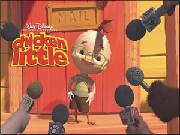|
|
||||
|
|
by Jeffrey Chen  One of the more disheartening movie-related ironies to emerge in a while is a section of Chicken Little that makes fun of the Hollywood system. In a scene where characters are watching a film in a theater, they see true events warped to make them more palatable to general audiences. The miniature hero is now a stud, the ugly girl is a babe, and the cowardly best friend has been converted to a macho tough guy; meanwhile, the central conflict of a menace chasing the heroes through a town has been changed to an intergalactic showdown, complete with spaceship battles. The implication here is that Chicken Little sees itself as original, or, at least, as above such silly pandering. Sadly, nothing could be further from the truth. Chicken Little doesn't have a single original idea in its head. Everything about it is derivative, from its zippy pace to its ironic humor. It falls back on standbys, like dusting off the used pop song for montages or reference gags (at one point, characters karaoke to the Spice Girls' "Wannabe" -- is that kind of joke still funny?). And it features a family-conflict theme too contrived to sell with any conviction. In the story, Chicken Little tries very hard to create a connecting bond with his father, and this Theme is gaudily spotlighted as if it were the biggest float in the Macy's parade. It's no spoiler to say there's a resolution, but after it occurs the father keeps repeating the fact that it's happened, belaboring the point as, of all things, a joke. In this way, the movie practically admits its own corniness and attempts to compensate for it by over-applying irony. I was shocked to watch this. I expected better. Disney folks are offering Chicken Little as evidence that they can survive the 3-D animated battlefield without Pixar. I had worried about their movie being nothing but a Pixar knockoff, and now I only wish that were true. The filmmakers, instead, have decided to use DreamWorks animated movies as their template. There can be no worse idea. Chicken Little emerges as the umpteenth bad descendant of Shrek, with overloaded postmodernism, "hip" irreverence, and tiresome dependence on pop culture references. And, to top it all off, the movie isn't even good-looking; it's a competition of inconsistent texture maps (some hairy creatures look hairy, others look smooth, all of them look sub-par) on grotesque character designs. And no character is more grotesque than the pig character, Runt of the Litter, who's the butt of fat jokes and emasculation humor. You mean it's ok to make fun of wimpy fat kids again? I repeat, I was shocked. Adding to the irony is the fact that Chicken Little was supposed to be Disney's shining example of the superiority of 3-D animated storytelling over traditional 2-D. To seemingly emphasize their point, these filmmakers didn't even give one backward glance at the glory of their past works to help guide them. Chicken Little couldn't be more dissimilar to the joyful projects of their last golden age -- The Little Mermaid, Beauty and the Beast, Aladdin. Where those movies emitted a human warmth and gave focus to believable character depictions, Chicken Little is a refrigerated parody of stock characters and situations, more concerned with being clever than being empathic. But, of course, who worries about storytelling when the Chicken Littles of animation cry, "The sky is falling!" over the supposed demise of 2-D animation? I wonder if this was the subconscious reason for Disney's choosing Chicken Little as their first 3-D project. They've selected a story where the protagonist originally brought disaster upon his friends thanks to their collective paranoia and gullibility, and modified it to one where the protagonist's concerns are actually justified. This would be a pretty clever metaphor if it were true, but the resulting movie is so unoriginal it would render the point moot. As it is, the ironies just keep piling up. How lamentable to watch Disney's artists join the current bad 3-D animated movie trend! They were always the pioneers; now they're the followers, and apparently somewhere around fourth in line. Please guys, listen. These 3-D movies don't have to be hip, flashy, zippy, ironic, pop culture-driven, 90-minute distractions for kids on any given afternoon. They don't have to be cynical when they present their moralistic themes. They need to believe in their characters. Why do all these movies seem stuck with this same personality? I think it's Shrek's fault. Just because that movie made fun of fairy tales, it seems every studio but Pixar has been bullied out of creating sincere stories. Only Pixar manages to do anything original now; the rest emulate Shrek, and it's a very sad day when Disney chooses to do the same. (Released by Walt Disney Pictures and rated "G" as suitable for all ages.) Review also posted on www.windowtothemovies.com. |
||
|
© 2024 - ReelTalk Movie Reviews Website designed by Dot Pitch Studios, LLC |



